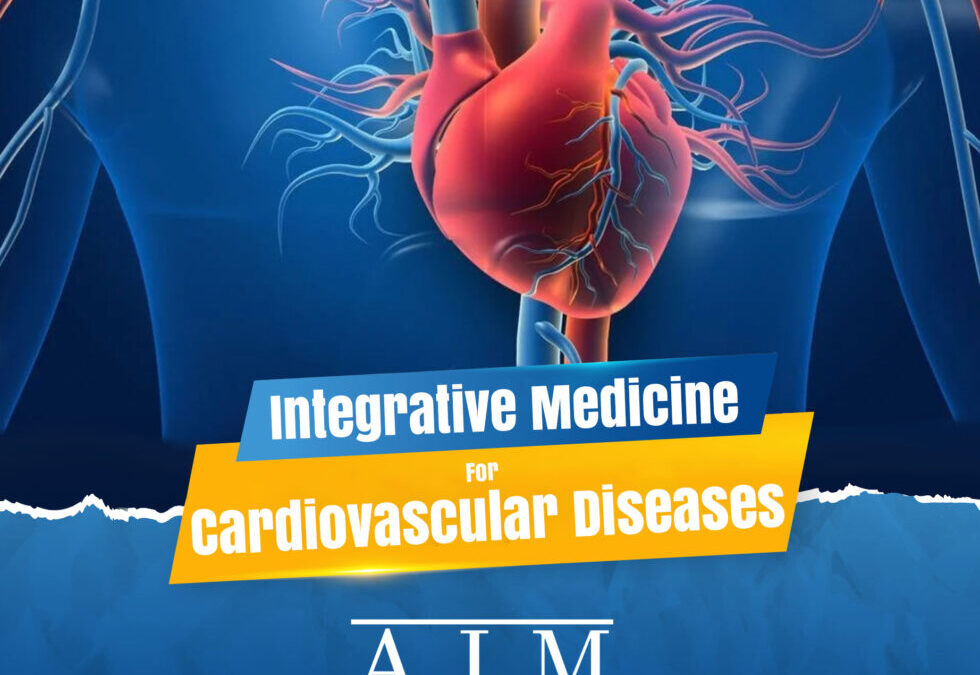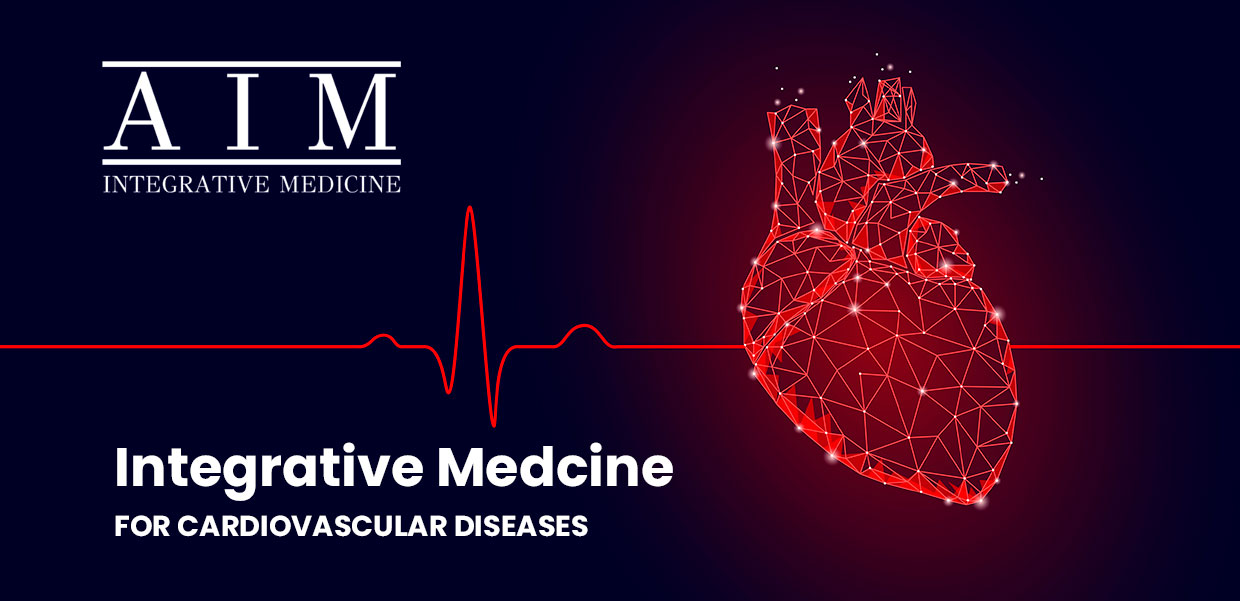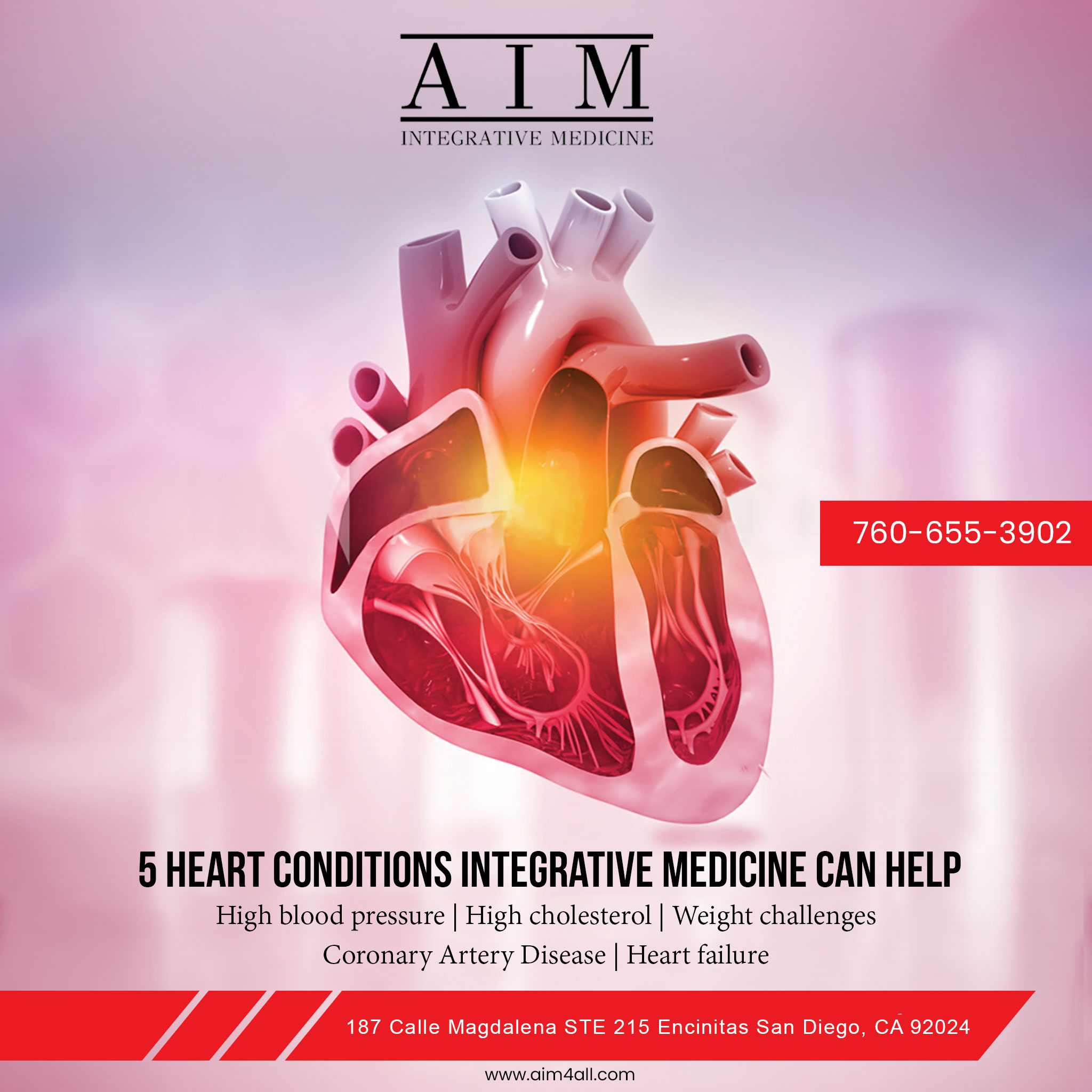Integrative Cardiovascular Care – San Diego
Cardiovascular disease (CVD) remains the number-1 cause of morbidity and mortality globally. Early intervention with angiography and broad-based pharmaceutical therapies has contributed to a decline in deaths from CVD in the United States, yet the prevalence of risk factors and economic burden of CVD remain exceedingly high.
Cardiovascular disease (CVD) is traditionally treated through medications and lifestyle modifications, yet adherence to these treatments is often poor. The use of complementary therapies is increasing, and it is vital for physicians to be aware of the risks and benefits of these options. This article summarizes the current evidence base on integrative therapies for the prevention and treatment of CVD, including hypertension, hyperlipidemia, coronary artery disease, heart failure, and arrhythmias.
Integrative medicine (IM) has developed an increasingly significant role in health care worldwide, including cardiovascular diseases (CVD).
Integrative Treatment Approach In Cardiology
The integrative treatment approach in cardiology focuses on bringing the “rest and digest” system into balance with the “fight or flight” system. Boosting the “rest and digest” nervous system often requires learning the art of meditation, yoga, and movement. It also involves understanding the impact of food on our bodies and putting healthful foods into our system to aid in proper digestion. It also requires us to understand environmental exposures, such as pollution and heavy metal exposures.
Integrative Medicine for Cardiovascular Disease and Prevention
Integrative Medicine can be an effective approach to managing and preventing cardiovascular disease, which is a leading cause of death worldwide. Here are some ways that Integrative Medicine can help:
- Nutrition: A healthy diet is key to preventing and managing cardiovascular disease. An Integrative Medicine practitioner can help create an individualized nutrition plan that emphasizes whole, nutrient-dense foods and limits foods that contribute to inflammation, such as sugar, processed foods, and trans fats.
- Exercise: Exercise is an important component of cardiovascular disease prevention. An Integrative Medicine practitioner can help create a safe and effective exercise plan that takes into account an individual’s unique needs and limitations.
- Stress management: Chronic stress can contribute to the development and progression of cardiovascular disease. Integrative Medicine offers a variety of stress-reducing techniques, such as mindfulness meditation, yoga, and acupuncture, to help manage stress.
- Supplementation: Certain supplements, such as omega-3 fatty acids, magnesium, and Coenzyme Q10, have been shown to have cardiovascular benefits. An Integrative Medicine practitioner can recommend appropriate supplements based on an individual’s specific needs.
- Mind-body therapies: Mind-body therapies, such as hypnotherapy, guided imagery, and biofeedback, can help manage stress and improve overall well-being, which can, in turn contribute to cardiovascular disease prevention and management.
- Traditional Chinese Medicine (TCM): TCM can offer alternative and complementary therapies that have been shown to be effective in the prevention and management of cardiovascular disease, such as acupuncture and herbal medicine.
It’s important to note that Integrative Medicine should be used in conjunction with conventional medical care. An Integrative Medicine practitioner can work with a patient’s healthcare team to create a comprehensive treatment plan that addresses all aspects of the individual’s health and helps prevent and manage cardiovascular disease.
5 Heart Conditions Integrative Medicine Can Help
Integrative medicine combines both holistic treatments and conventional options so that you’re getting a fuller approach to treatment. The more well-rounded approach examines all of your body’s systems and views them as connected. It’s particularly useful in addressing the underlying illnesses that cause heart disease.
In this article, Dr. Hetal Patel of AIM Integrative Medicine, located in San Diego explains more about how integrative medicine can help five common heart conditions.
1. High blood pressure
High blood pressure is often an early warning sign of heart disease. Did you know that lifestyle changes can help lower blood pressure?
Exercise, a change in diet, quitting smoking, and stress reduction are just some interventions proven to lower high blood pressure. Exercising 30 minutes five times a week lowers your blood pressure by 5-8 mm Hg.
2. High cholesterol
Having high blood cholesterol increases your risk of heart disease. But the condition is also reversible with dietary changes, quitting smoking, and regular exercise. Dr. Hetal Patel can help you explore how to change your diet specifically for helping to lower cholesterol.
Foods that can lower cholesterol include those high in soluble fiber, such as oatmeal, apples, and beans. You’ll also want to avoid processed baked goods and other processed food, as many of these are high in trans fats, which are linked to high cholesterol.
3. Weight challenges
You may struggle with your weight. You aren’t alone; the majority of Americans do. You may not think a few extra pounds is a big deal, but it increases your risk of heart disease.
Losing some weight might seem like a daunting task. But the truth is, even losing a little bit of weight has positive benefits for lowering your risk of heart disease. If you are significantly overweight, losing 10% of your body weight can improve your heart health.
4. Coronary Artery Disease
Coronary artery disease develops over many years. It is caused by damage to the lining of your blood vessels. The damage can be due to smoking, high blood pressure, high cholesterol, diabetes, or not being active enough.
Dr. Hetal Patel can help you change the lifestyle factors that lead to coronary artery disease before it gets worse. In addition to getting more exercise, improving your diet, and quitting smoking, she also recommends reducing stress. Chronic stress has an oxidative effect on your body, making disease states such as heart disease worse.
Integrative medicine helps balance the “fight or flight” mode that most of us live with (often unconsciously) with a “rest and digest” mode. That includes activities such as yoga and meditation, as well as reviewing environmental factors.
5. Heart failure
If you’ve been told that you have heart failure, you’re understandably anxious. And while you shouldn’t stop seeing a cardiologist if you have heart failure, you can benefit from seeing an integrative medicine specialist, too. The above treatments can still help you even if you’re already living with heart failure.
Reduce Your Risk of Heart Disease with Integrative Medicine
Cardiovascular diseases claim more lives than the other top 4 leading causes of death combined in the U.S., and yet the average person isn’t aware that as much as 80% of heart disease conditions are preventable.
So what would an integrative doctor recommend to keep your heart healthy that you can start right now? We’ll focus on three main categories of lowering your risk:
- Food and diet recommendations
- Lifestyle Factors
- Early testing and detection methods
FAQ about Integrative Medicine and Cardiovascular Diseases
What are integrative therapies for heart failure?
How mind-body therapies are incorporated into the management of cardiovascular diseases?
Integrative Medicine (Holistic Heart Health)
- Coronary artery disease (CAD) and
- atherosclerosis
- Palpitations
- Cholesterol Disorders
- High blood pressure
- Heart attack
- Diabetes
- A family history of heart disease
- Chest pains not related to heart disease
- Stress and muscle tension
- Anxiety
- Smoking addiction
- Eating disorders
- Sleeping problems




Recent Comments